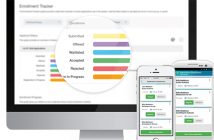
According to a recent report from the Campus Computing Survey, textbooks and course materials are headed toward becoming entirely digitized.
The report, “Going Digital: Faculty Perspectives on Digital and OER Course Materials,” finds that the key factors that come into play when college faculty members make decisions pertaining to textbooks and other course materials include the level of quality and the cost involved.
Findings from a survey taking place between fall 2015 and winter 2016 of 2,902 college and university faculty at 29 two- and four-year institutions discovered 97% of those surveyed consider their own assessment of quality to be the deciding factor when selecting course materials. Cost was found to be the second most important factor.
A separate report from the National Association of College Stores (NACS) notes that the traditional method of choosing course content is currently being challenged as digital players, open courseware, open educational resources (OER) and adaptive, personalized learning all offer reduced costs and improved academic outcomes.
The NACS report goes on to suggest that other forces are at play, including an increased movement toward participation in online courses, as more students begin to access learning materials online and in digital form. In addition, there has been a rise in the number of students who rent new or used textbooks online, with some going as far as using legal and illegal download websites.
“[Also,] Amazon has entered the college learning content ecosystem with its Amazon Campus Program,” notes the report. “Its scale, brand power, and technology leadership is a game changer.”
While faculty members in the CCS report suggest that quality is their highest measure when making decisions concerning textbooks and course materials, and the NACS report finds personalization and analytics functions to be valued features in digital textbooks, only 45% of those surveyed in the CCS report said digital course materials offered a significant value that could not be found in print materials. Just 44% said they would be more likely to use digital textbooks if reports on course performance were included.
In addition, only 35% said digital course materials would offer a better learning experience than print, and 27% considered digital course materials to have a beneficial impact on student learning when compared to print materials.
“While the transition from print to digital course materials may be inevitable,” stated Fred Weber, CEO of ICBA, “these new data make two things clear. First is that the pace of change is much slower than anticipated by publishers, administrators, digital advocates, and campus IT professionals. And second, most faculty are not convinced that digital products have a positive impact on student learning outcomes.”
Casey Green, founding director of the Campus Computing Project and the conductor of the ICBA survey, said another issue involved was access. Green went on to say that while faculty members noted that putting materials on a digital platform greatly lowered the cost associated with accessing them, many faculty members, especially those at community colleges, said their students do not own the tech platforms required to access the content.




